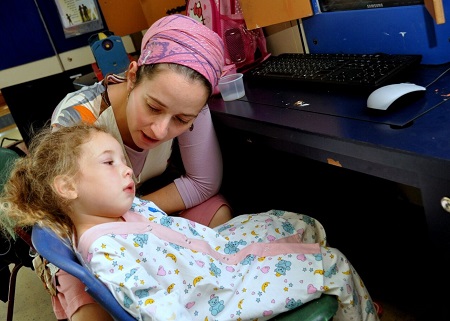
Through research into pediatric pain management during her PhD program at the University of Pennsylvania and a postdoctoral fellowship at Yale University in New Haven, Ct., as well as replicating her studies when she returned to the Hadassah Medical Organization, Nurse Yaffa Zisk Rony, PhD has concluded that parents are unintentionally under-medicating their children.
“Of course, parents really want to do the best for their children,” emphasizes Dr. Zisk Rony, head of the Advanced Practice Nursing (APN) master’s degree program in the Hadassah-Hebrew University Henrietta Szold School of Nursing; “however, they worry about a medicine’s side effects and their kids getting addicted to strong medicines.” The result, she says, “is like trying to put out a fire with a little teacup of water.”
Dr. Zisk Rony, recently appointed as Chair of the Committee of Ethics in Research Involving Humans for the Hadassah-Hebrew University Faculty of Medicine, Dentistry and Life Sciences, explains further: “Children expect their parents to know they are in pain; we teach them early on that their parents know what they need.” But, she says, parents often don’t know their children are suffering from pain because, rather than cry out, some children become withdrawn and others distract themselves with an activity, such as playing.
Even when parents do choose to give their children pain medication, Dr. Zisk Rony notes, they often replace the recommended medications with Advil or Tylenol and the children remain in pain either because these medications are not potent enough or because parents typically give fewer than the recommended number of doses. In addition, she says, parents also forget that medicines like Tylenol take about 20 minutes to work, so if their child does not feel better right away, they assume the medicine is not effective and stop giving it. When parents do give their children the medicine prescribed, they often do not give the full recommended dosage because they are afraid of overmedicating their children.
In her extensive research, Dr. Zisk Rony has discovered that these practices are shared by parents from various countries and cultures–English-speaking parents in the United States, parents in Finland, and Hebrew and Arabic-speaking parents in Israel and from the Palestinian Authority. “Parents are parents are parents,” she says, and these practices were evidenced no matter what the cause of the children’s pain–whether due to a simple fracture of an arm or leg, a sore incision following surgery or cancer treatments. This was also the case for parents of children with special needs who were in chronic pain.
The problem of under-medicating children goes beyond allowing children to remain in pain. As Dr. Zisk Rony brings out, “untreated pain can cause damage at the tissue level.” For example, consider a child who has a wound from an accident or just had surgery. If he or she cries excessively from pain, this can cause the wound or incision site to bleed. By the same token, a child in pain after having had his tonsils removed may refuse to drink and become dehydrated, which can be harmful to his recovery.
Dr. Zisk Rony is now in the process of working on a parent resource program that she calls a “computerized tailored intervention.” With the goal of helping parents to handle their children’s pain most effectively once they return home, the idea is for each parent to receive information from the program that suits his or her individual needs, based on information that the parent provides.
The program will ask the parent questions about the child’s current pain situation and reinforce the prescribed pain regimen in a way that addresses each parent’s individual concerns. It will also recommend appropriate non-pharmacological options to try while the parent is waiting for the medicine to take effect, such as comforting or playing a game with the child.
As Dr. Zisk Rony explains, “In tailored interventions, you first assess what parents know and think. Then you assess the current situation and generate responses based on these assessments.” This type of intervention, she relates, has been used for helping people to diet and to stop smoking, but it has not been used to help a parent manage his or her child’s pain.”
With this added support and reinforcement, Dr. Zisk Rony believes, parents will feel more confident that they are medicating their children safely and become more comfortable treating their children. Their children, in turn, will be as pain free as possible. “This is the basis for my intervention,” she says.
